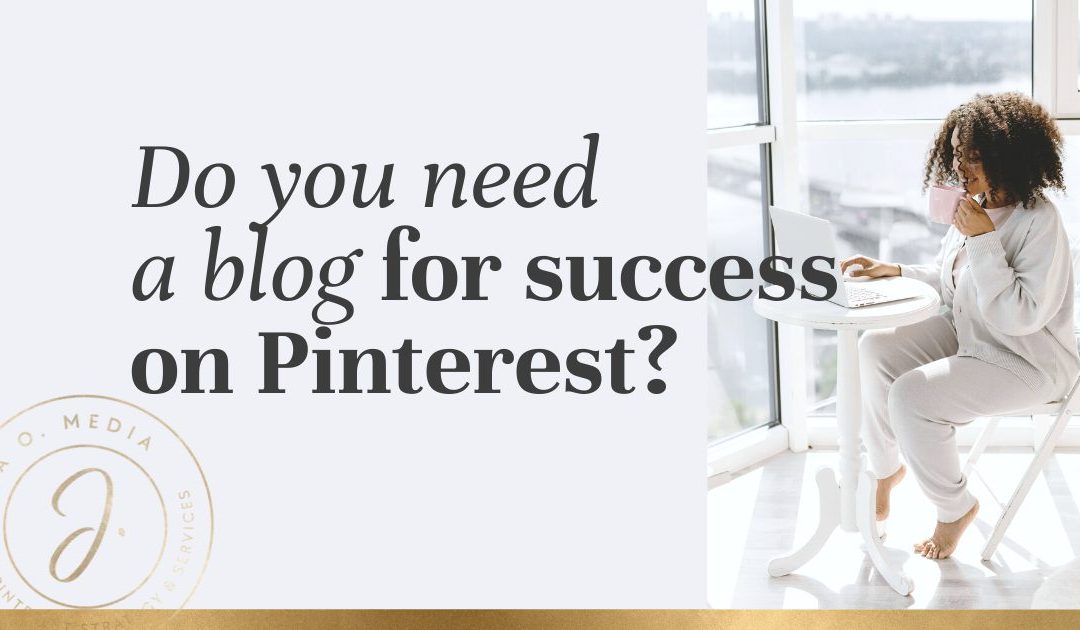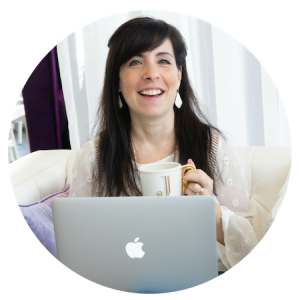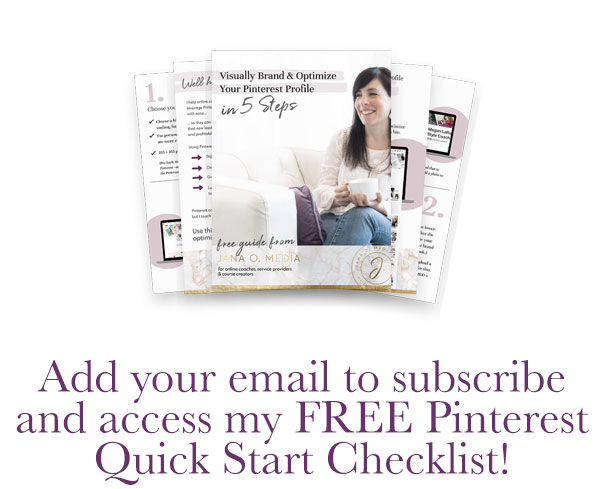When it comes to using Pinterest to get more eyes and ears on their content, attract clients, and sell more of their offers… people in my audience often have a 🔥 BURNING 🔥 question:
Will I need a blog for Pinterest marketing? 🧐
Not kidding… I probably get this question once a day!
Well fret not. I’m about to answer this question – once and for all.
I present… the definitive guide to whether a blog is a *requirement* for Pinterest success!
{Read it all, or skip to the section that grabs you!}
I’ll be covering…
- The short answer to “Do I need a blog to be successful on Pinterest?”
- Two reasons why you can post on Pinterest – without a blog – and still be discovered by future clients
- Other types of effective content that you can pin – when you don’t have a blog
- A few reasons you may *still* want to consider a blog for your coaching business – and for your Pinterest presence
I know you want to use Pinterest to attract more perfect-fit clients. I know you’d loooooooooove to grow your audience using the platform – and leverage it to drive more sales of your coaching programs and other offers.
(And I know you want to do allllll of that on Pinterest – because it’s low-drama and low-maintenance, unlike some of those social platforms you’re spending time on… 😏)
But this whole “blog” question keeps coming up for you, so let’s address it – head on!
Let’s get you ‘in the know’ – so you can make some really good, informed decisions around this!
Do you need a blog to be successful on Pinterest??
Here’s the short answer: You will need to have a way to give value and nurture people who find you on Pinterest. Sometimes that’s a blog.
Now here’s the longer answer: 🤓
Since Pinterest is a search and discovery platform (not social media!)… it’s going to attract a lot of *NEW* people to you. (i.e. people who don’t already have a lot of “know, like, trust” with you – yet.)
Think for a sec about the most traditional way a future client finds you on Pinterest:
-
-
- She finds your pin in her main feed or in search, because she searched for something that matches with your keywords. (Which is amazing! Think about it. She’s ACTIVELY searching for something in your zone of genius!)
- Your pin grabs her attention – because it is designed with Pinterest best practices and speaks to something she desires to solve or have.
- She responds to your call to action and clicks to… YOUR CONTENT. 👈🏼👈🏼👈🏼
- Your content is really good. It solves a problem for her… It’s inspiring… or it offers her a peek at what’s possible for her, sooooo…
- She wants more – and signs up for a freebie you have. (Or joins your Facebook group, or purchases your low-ticket offer… whatever you’re aiming for to “capture” her as a lead.)
-
(Psssst… The above is an example of part of a “customer journey” that a future client might take from Pinterest to investing in your offer.)
Now, let’s talk about this CONTENT that you just used to convert her with…
It might be a blog post.
Certainly, a blog is one common way to offer her value and an opportunity to take the very next step with you.
However, It’s also increasingly common for Pinterest marketers to link pins to OTHER types of “anchor” content. (Anchor content is another term for longer-form content. It’s like the “big rocks” in your content strategy. More on that below!)
So bottom line is this:
Pinterest is a way to get your expertise, content, and offers SEEN by more ideal future clients. To generate leads (or students, or podcast subscribers, etc) – you will need some content to CONVERT Pinterest pinners to the next step in the journey with you.
That content could be a blog – but it doesn’t have to be.
Okay, but now you may be wondering…
Can you even post on Pinterest without a blog?
The answer to this is a resounding YES! 💃
And there’s even more good news here:
You can *even* still get discovered this way by future clients – without a blog… And technically, even without creating a lot of pins that link to a blog.
Here’s why:
1. Pinterest profiles and boards are also discoverable in search.
When pinners search for keywords or phrases on Pinterest, the platform’s search algorithm not only displays relevant pins – but it also offers related profiles and boards.
This is one reason why optimizing your Pinterest profile and boards is crucial for increasing visibility and attracting your future coaching clients or customers.
To see this in action, press play on this 5-minute video:
2. Pinterest Idea Pins allow you to create content directly ON the platform.
When Pinterest Idea Pins came along in 2020, they changed the game in a lot of ways.
These little gems 💎 are a unique type of content that can be created directly on the platform. A lot of pinners love them – and they are a very engaging way to share and discover ideas.
Unlike standard pins, which will usually link to external content (like a blog post!), Idea Pins allow creators to present a complete idea or story – right on Pinterest!
This makes them easily consumable – without pinners needing to leave the platform.
By leveraging the power of Idea Pins, creators can deliver valuable content and inspire their audience right within Pinterest, making THEM soooooo effective for sharing ideas, showcasing expertise, and attracting ideal clients to your coaching offers. No blog required!
(To create an Idea Pin, simply tap on the “+” button on your Pinterest profile and select “Idea Pin.” From there, you can upload images, videos, or design custom graphics using the platform’s built-in creative tools.)
To learn more about creating *profitable* Idea Pins, check out my course, Idea Pin Brilliance. The course covers everything you need to know to create Idea Pins that grow your audience, your influence, and your income.
Okay, now let’s turn our attention for a sec to other ways you can create effective anchor content (that aren’t blogs!)
(Pssssst…. You can 📌 pin this article for reference to your “Pinterest marketing” board:)
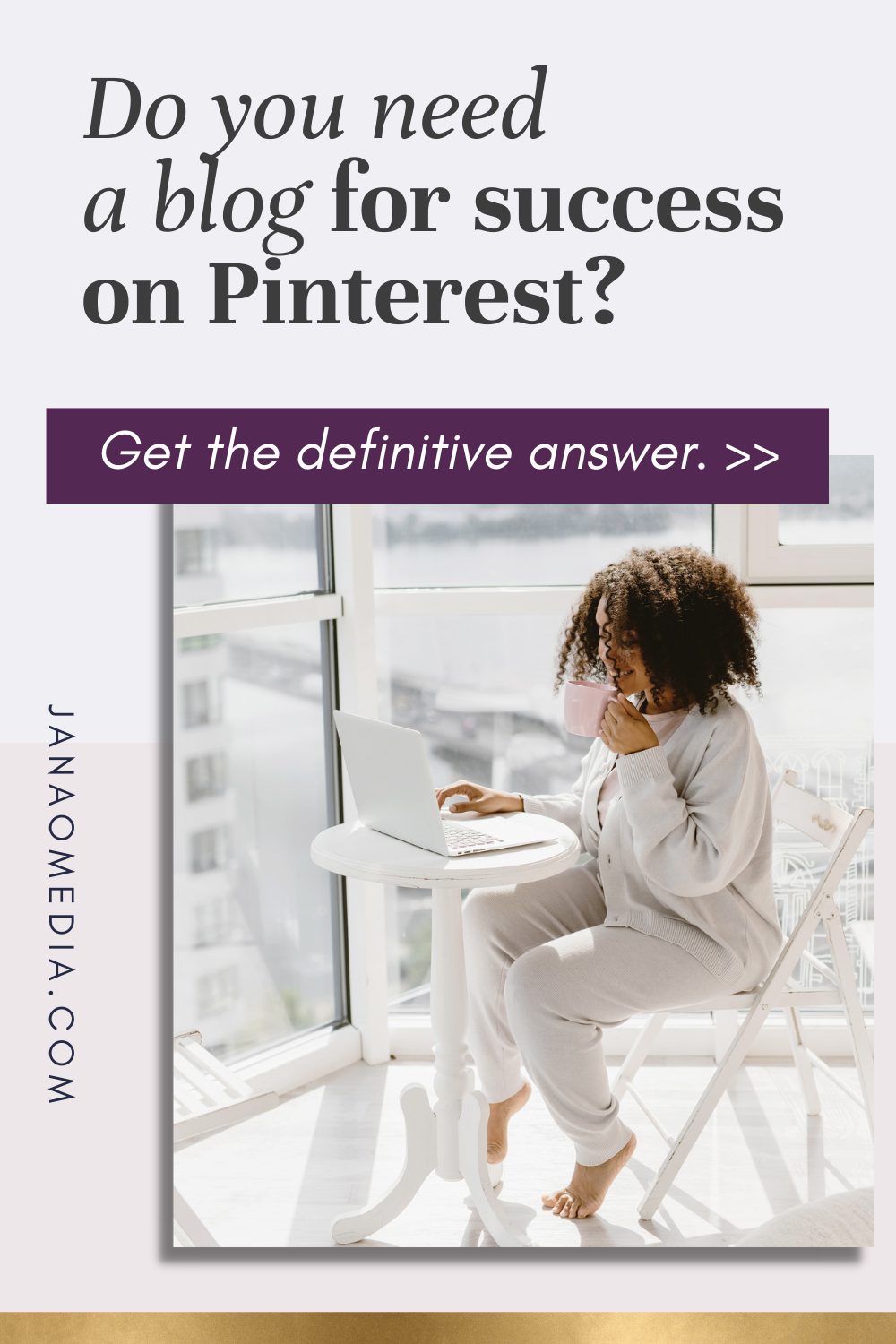
Other types of “Anchor Content” you can pin to Pinterest:
Okay… So we know this:
To provide value and nurture potential clients discovering you on Pinterest, it’s important to create some type of content.
We’ve gotten 💎 diamond-clear on the fact that Pinterest is a search and discovery platform. As such, it attracts people to you who aren’t yet familiar with you (Yay! That means audience growth!), so offering valuable content is key to building trust and rapport.
Now… If that valuable content isn’t a blog, what else can it be?
I’ve seen clients, students, and peers of mine have success with pinning…
- *Podcast episodes. (Ideally, this includes show notes on your own website. Click here to read about Pinterest-friendly podcast show notes!)
- Youtube videos (long-form; not so much the shorts for this purpose!). More on a Pinterest for Youtube strategy here.
- *Livestreams on social media platforms like FB or IG.
- *Long-form social media posts. (Think LinkedIn articles, longer Facebook posts, etc.)
- Pinterest Idea pins. (As discussed above, these are a bit richer than short-form video on other platforms – so they lend themselves better to creating content that’s meatier than an 8 to 12 second Reel or Tiktok.)
* Caveat: I’d prefer to see you embed the asterisk-ed ones on your own website!
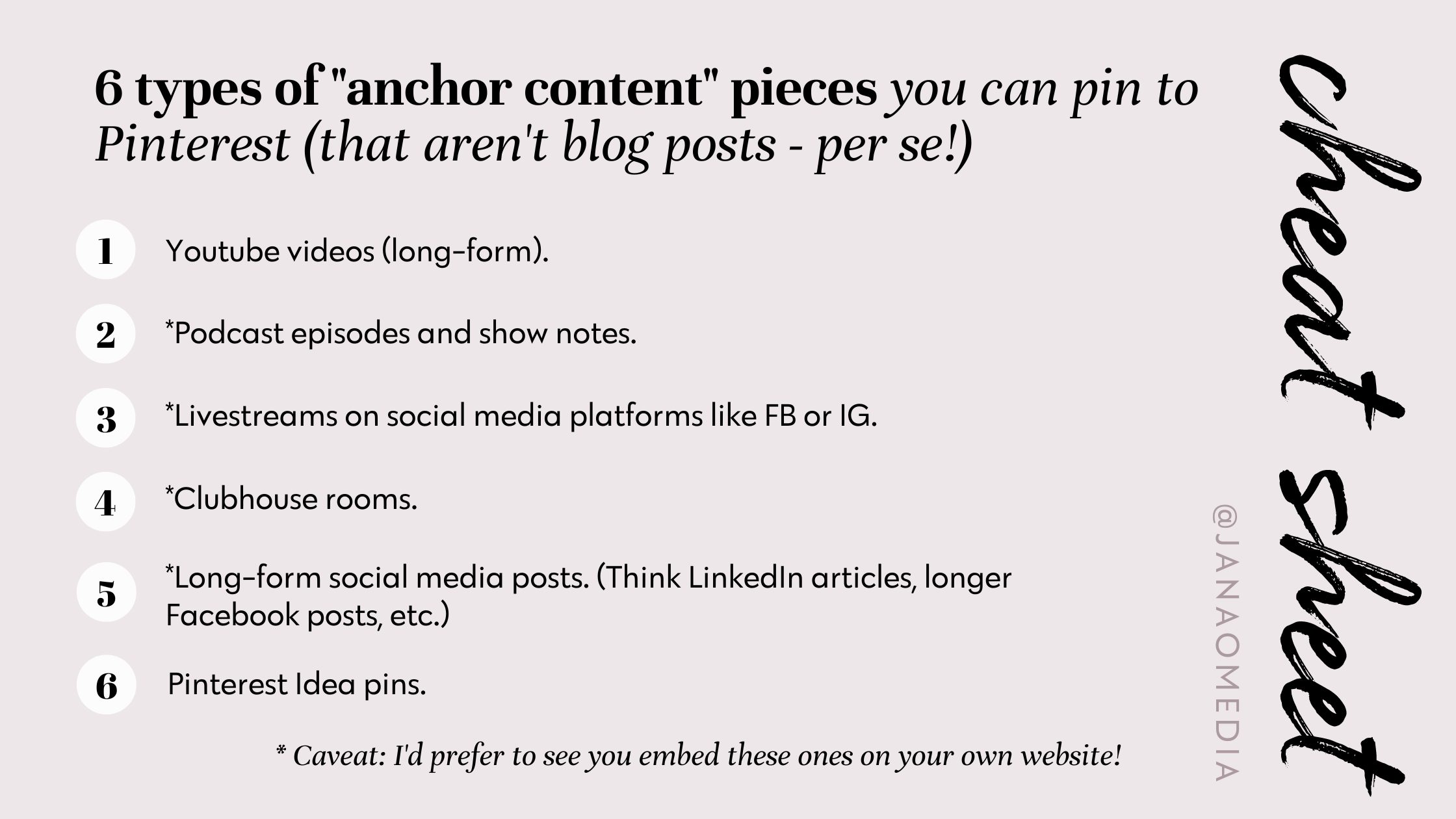
These are all types of “anchor content” you can create as a coach or other online expert.
(Anchor content = Thorough, high-quality, and authoritative pieces of content that serve as a foundation for your online presence. It is typically longer, more in-depth, and covers a topic extensively, providing valuable information to your audience.
As a coach, your anchor content should help people learn and more deeply understand the ideas that make them desire to invest in your programs.)
All that being said… I sort of love a blog for you.
Whenever I have a client who says they want to blog more, I feel like Alexis Rose from Schitt’s Creek when I say…
“I love that for you!”

While having a blog is not absolutely necessary for successful Pinterest marketing, it can be super beneficial for your coaching business – especially when your goal is to attract clients for your coaching programs.
A blog can serve as a valuable content hub that allows you to create and share helpful insights, tips, and resources for your target audience.
It *can* be that central place where future clients go to binge on your content…
Where you can help them understand the things they need to understand, to build the value of your paid offers.
Where you can build those critical “know, like, and trust” factors.
(In my High-Leverage Content framework, I teach about creating content that pre-sells your offers. One way to deliver this content can be a blog.)
And when a coach or other online expert comes to understand that she needs a “content hub,” a blog often feels like it makes sense.
And, in addition to being great for your overall business content game, a blog can be quite helpful for your Pinterest presence…
A blog isn’t required, but it can help with Pinterest success.
Here are some reasons why having a blog can enhance your Pinterest marketing efforts:
1. When you have a blog, you’re sending future clients to *your own website* to consume your content.
When you create high-quality, valuable content on your blog, you can use Pinterest to drive people to your own “owned land.” You have a lot of control here, so you can create and change up the customer journey as needed.
2. Having blog links to pin can increase your Pinterest reach.
Having blog posts gives you more URLs to share on Pinterest. This means you can pin more frequently – if you want to. Plus, blog posts can be easily shared and repurposed across various social media platforms, allowing you to reach a wider audience in general.
3. A blog gives you a powerful tool for building your email list.
You can use your blog to capture email addresses and build an email list, allowing you to nurture relationships with future clients through email. And this sets you up to be able to make more sales when you send sales emails, too.
In summary… No, you don’t *need* a blog for Pinterest success!
While having a blog isn’t a strict requirement for success on Pinterest, it can be a valuable tool for your coaching business. By creating engaging content and leveraging Pinterest’s search and discovery features, you can attract new clients, grow your audience, and land more clients.
However, remember that blogs are just one form of anchor content, and there are many other formats you can explore.
Ultimately, the key is to provide pinners who are NEW to you with valuable, relevant content… Content that resonates with your future clients and aligns with your overall business growth goals, regardless of the format you choose!
How do you feel about having a blog? Love the idea? Not so much? Tell me in the comments! ⬇⬇⬇

